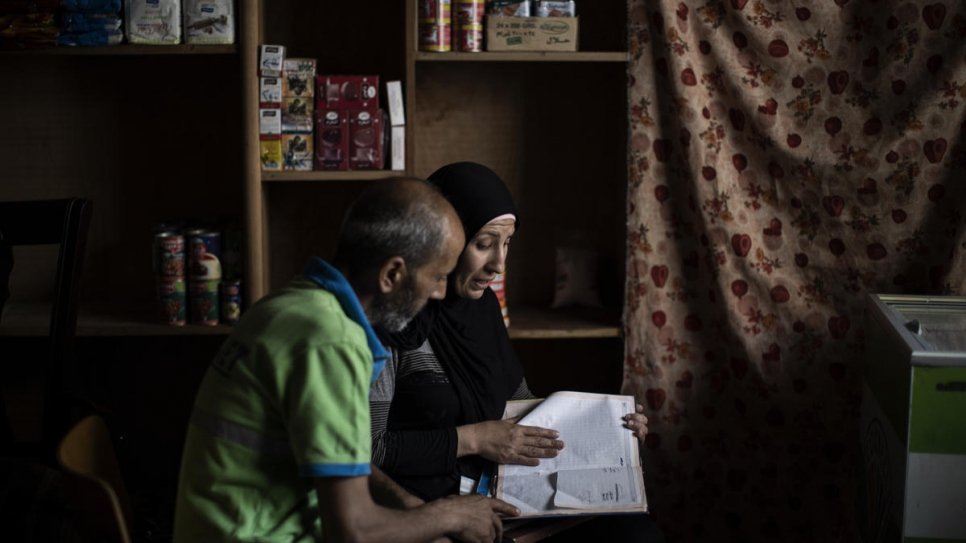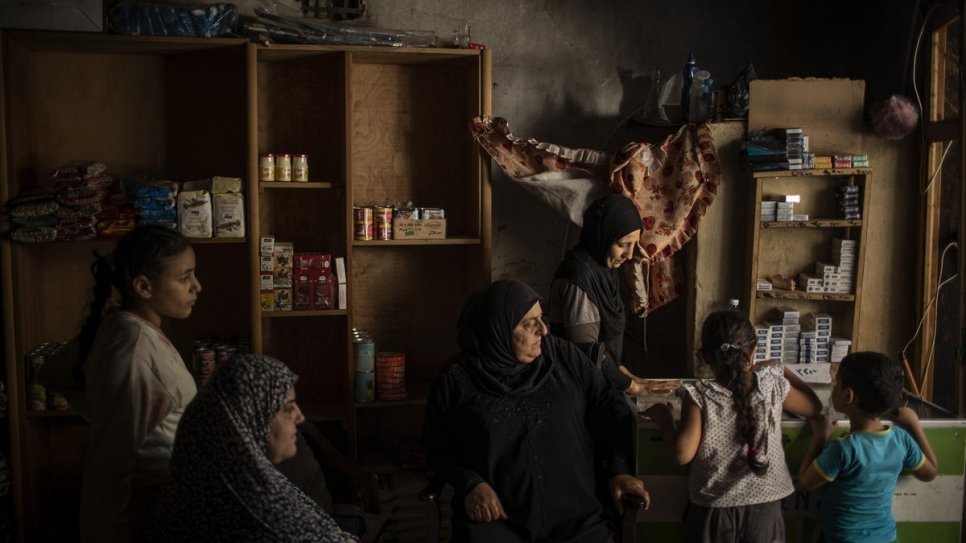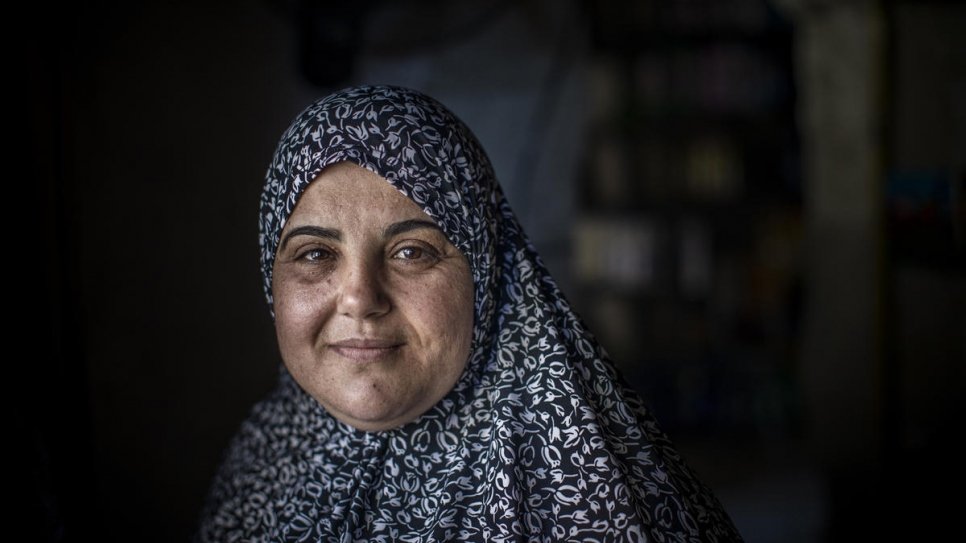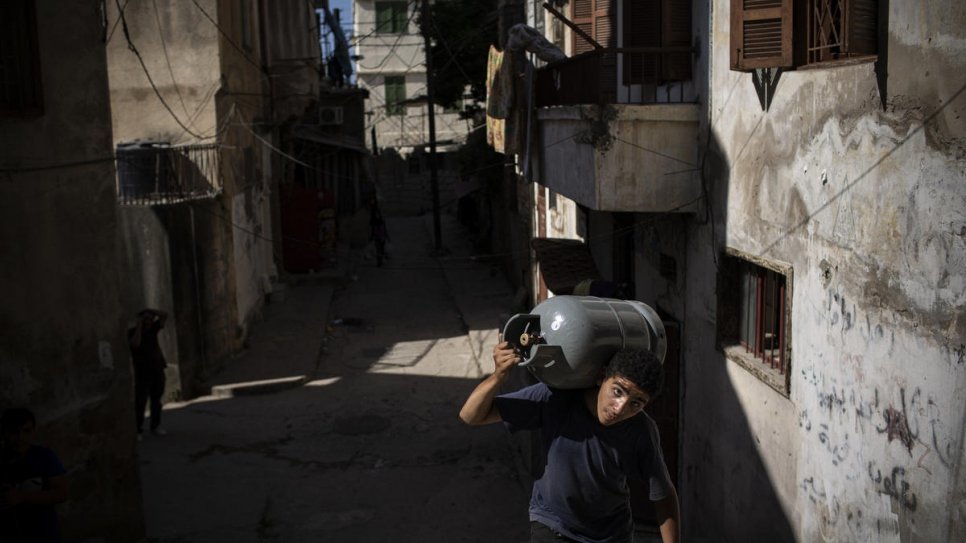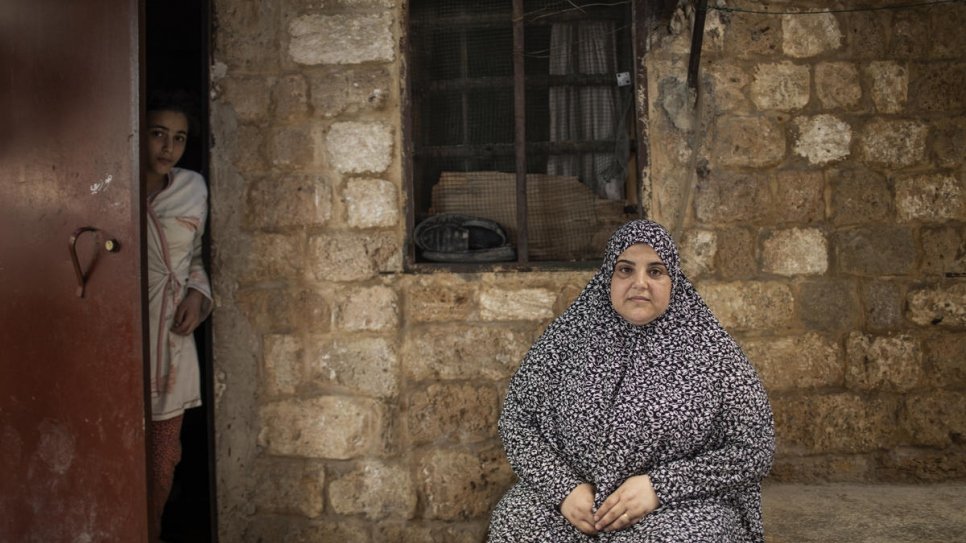Economic misery engulfs Syrian refugees and their hosts
In Lebanon, the capacity of local community and Syrian refugees to provide mutual support is being stretched to breaking point by economic turmoil and the COVID-19 crisis.
Kawkab Mustafa pictured inside her shop in the Bab al-Tabbaneh neighbourhood of Tripoli, Lebanon.
© UNHCR/Diego Ibarra Sánchez
Behind the counter of her small convenience store in a rundown neighbourhood of Tripoli, northern Lebanon, 35-year-old Kawkab Mustafa keeps a list of debts owed to her by customers she has allowed to buy goods on credit. In recent months, the list has grown so long she needs four separate notebooks to record all the entries.
Kawkab and her clients, who include both Lebanese locals and Syrian refugees, were already feeling the pain of months of financial turmoil, accompanied by political protests, that has hamstrung Lebanon’s economy and pushed as much as 45 per cent of the country’s population under the poverty line, according to the World Bank.
The arrival of COVID-19 and restrictions to contain its spread in March have brought further misery, leaving many unable to work and pushing them closer to the brink of destitution.
"We didn't think we would be in this situation."
“The situation is seriously bad here,” Kawkab said. “The neighbours used to be able to pay their debts before, but … they all lost their jobs. We keep thinking it will get better, we didn’t think we would be in this situation. Then corona came and levelled us to the ground.”
Lebanon is currently home to 892,000 registered Syrian refugees, and has the highest per capita population of refugees in the world. According to the most recent assessment by UNHCR, the UN Refugee Agency, nine out of ten Syrian refugee families in Lebanon were living in debt even before COVID-19 exacerbated the situation, with average household debt levels of US$1,115.
For Kawkab, business is so bad that she has fallen behind on rent and is in arrears to her own suppliers, while her husband – a refuse collector – has not been paid for three months. The weekly medication she needs to manage a kidney condition is beyond her reach, putting her health at risk.
“I need an injection every week, but now I can only afford on injection every three weeks,” she explained. “If the situation continues like this, I won’t be able to pay the rent for the shop. I owe three months’ rent on my apartment too.”
Despite these dire circumstances, she continues to help her most vulnerable customers where she can, extending more credit to them and allowing them to pay her back bit-by-bit when they can afford to.
One of her regulars is Syrian refugee Bodour Al-Qader, who fled to Lebanon from Homs in 2012. With her husband currently unable to find work, they have run up debts of 500,000 Lebanese Pounds (US$331) in recent months and fallen behind with the rent.
“Before … my husband might work for a day or two per week and it would help us get by. Now it’s been three or four months that we haven’t paid rent,” Bodour said. “I borrow from Kawkab; she knows me now. When I have money, I will give it to her.”
Kawkab said she believes she is doing the right thing even if it makes her own situation more precarious, and that her generosity would ultimately be repaid by others.
“I have to stand by people, and if there is anything I could do I would do it,” she said. “It’s right this way. In these times no one lends, but in my case, they are kind to me now because I help them, and when I am going through hard times, they stand by me.”
See also: UN chiefs urge sustained support to Syrians and the region ahead of fourth Brussels conference
As the economic slump undermines the ability of the Lebanese people to provide for themselves, it also erodes their capacity for even the smallest acts of generosity towards Syrian refugees. International support for Lebanon and humanitarian agencies is more crucial than ever to help the country and the Syrian refugees it hosts.
With governments coming together on 30 June for a virtual pledging conference for Syria, UNHCR is urging them to provide enhanced funding for more than 5.5 million Syrian refugees and the countries hosting them in the region, and millions more inside the war-torn country in need of humanitarian assistance.
For Kawkab, with no immediate prospect of an improvement in her circumstances, for now she must content herself by finding comfort where she can.
“I have faith in God that he will change this situation. If God doesn’t help us, who will?”

